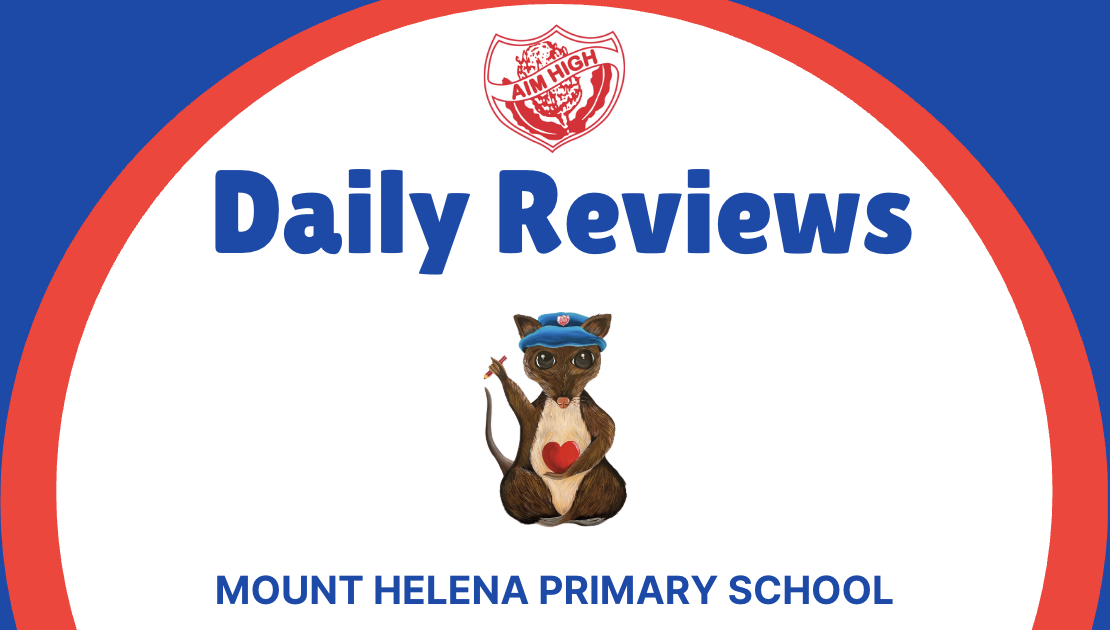Literacy
At Mount Helena Primary School, we have a high focus on literacy. Literacy is the ability to read, view, write, design, speak and listen in a way that allows you to communicate effectively.
In order to assist our students to apply these communication skills to effectively connect, interpret and understand the world we live in, we use multiple programs to enhance our teaching program.
Literacy Block
Each classroom at Mount Helena Primary School implements a structured Literacy Block, guided by the Gradual Release of Responsibility model—“I do, We do, You do.” This approach allows teachers to explicitly teach, model, and reinforce essential skills in phonics, spelling, grammar and punctuation, vocabulary, reading, and writing. Through targeted instruction and meaningful practice, students build confidence and competence as they consolidate their learning and apply new skills independently.
Daily Reviews
At Mount Helena Primary School, Daily Reviews in Literacy are a key strategy for reinforcing essential reading and writing skills. These short, focused sessions revisit previously taught concepts such as phonics, spelling patterns, grammar, and vocabulary. By regularly reviewing and practising these foundational elements, students strengthen their understanding, improve fluency, and build confidence in applying their literacy skills across all areas of learning.
Click on the image to see MHPS Daily Reviews in action
Talk for Writing - Kindy to Year 6
Talk for Writing is a powerful, evidence-based approach to teaching writing that empowers students to become confident, creative, and independent authors. At Mount Helena Primary School, we use Talk for Writing to immerse students in rich language experiences through oral storytelling, modelled texts, and shared writing. By internalising language patterns and exploring text structures, students develop a deep understanding of how writing works. This approach supports all learners by building vocabulary, enhancing comprehension, and fostering a love of storytelling and written expression.
Heggerty - Years K - 2
At Mount Helena Primary School, we use the Heggerty Phonemic Awareness Program to build strong foundational literacy skills in our early years classrooms. This daily, research-based program supports students in developing critical phonemic awareness—the ability to hear, identify, and manipulate sounds in spoken words. Through engaging and consistent routines, Heggerty helps students strengthen their listening and speaking skills, which are essential for successful reading and writing development.
Spelling Mastery - Years 3-6
Spelling Mastery was developed in line with best practice instruction, that teaches students dependable spelling skills by blending three approaches: the phonemic approach, the whole word approach and the morphemic approach.
Spelling Mastery interweaves these three approaches according to students' skill development and provides straightforward lessons to help you efficiently and effectively teach the spelling skills students need to become proficient readers and writers. It will assist students in all areas of learning.
This Direct Instruction program provides instruction in small, carefully scaffolded steps to help students master each concept before a new one is presented. Frequent opportunities for review help students reinforce and retain each concept they master. Spelling Mastery focuses on how words are constructed so they can apply that knowledge of word construction to unknown words.
Letters and Sounds - Kindy to Year 2
This program is used at Mount Helena Primary School from Kindergarten to Year 2 and is used as an intervention program for students in Years 3-6. The program aims to build children’s speaking and listening skills in their own right as well as to prepare children for learning to read by developing their phonic knowledge and skills. It sets out a detailed and systematic programme for teaching phonic skills for children starting by the age of five, with the aim of them becoming fluent readers by the age of seven. There are six overlapping phases:
Phase 1: Activities are divided into seven aspects including environmental sounds, instrumental sounds, body sounds, rhythm and rhyme, alliteration, voice sounds and oral blending and segmenting.
Phase 2: Learning 19 letters of the alphabet and the one sound for each. Blending sounds together to make words. Segmenting words into their separate sounds. Beginning to read simple captions.
Phase 3: The remaining 7 letters of the alphabet, one sound for each. Graphemes such as ch, oo, th. On completion of this phase, children will have learnt the ‘simple code’, ie, one grapheme for each phoneme in the English language.
Phase 4: No new grapheme-phoneme correspondences are taught in this phase. Children learn to blend and segment longer words with adjacent consonants.
Phase 5: Now we move on to the ‘complex code’. Children learn more graphemes for the phonemes which they already know, plus different ways of pronouncing the graphemes they already know.
Phase 6: Working on spelling, including prefixes and suffixes, doubling and dropping letters etc…
Here are some quick activities you can do at home with your child to help them to develop their skills in literacy:
Kindergarten to Year 2
- Keep blank paper and pencils handy at home for writing activities
- Read with and to your child every day
- Have your child collect and sort the mail – who are the letters for and who are they from?
- Create a collage using junk mail, old magazines, or your child’s drawings with a particular focus – this could include pictures of things beginning with /s/ or all pictures showing a particular colour…
Years 3-6
- Read some of the same books as your child and talk about the characters, storylines and themes
- Read the newspaper with your child each morning – choosing an article to discuss and ask questions such as ‘what is the report telling you?’ and ‘what does this word mean?’.
- Talk about movies you have seen; discuss why a filmmaker may have created a movie in a certain way, the purpose of the film, who the film was made for (audience)…


